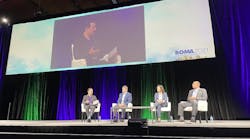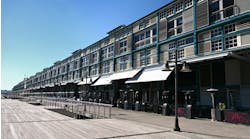The Saturday general session at the BOMA 2021 International Conference & Expo closed out with an insightful panel discussion moderated by David Franklin, manager of commercial presales at Yardi, the sponsor of the session. Panelists included Adam Portnoy, president and CEO of The RMR Group; Melanie Colbert, principal of operations at LBA Realty; and Andrew Cook, senior vice president of operations for the East region at Hines.
Under Franklin’s lead, these industry executives discussed the trends they’re seeing firsthand as a result of the pandemic, how they’re keeping their teams motivated, the rise in ESG (environmental, social and governance) investments and proptech (property technology), the growth of the industrial segment and what development looks like now.
Portnoy said that The RMR Group has invested $600 million this year in new office acquisitions across the country. “We’re making a bet on office,” he said, adding: “Ultimately, I think most companies are going to come back with one to two days a week at home for various reasons like workplace retention and keeping turnover down. So that’s why we’re bullish on office.”
Colbert and Cook both touched on how, at their properties, tenant experience has been more important than ever, with robust communication and upping the game on amenities. (Along with concert venues and more outdoor spaces, Colbert revealed LBA is installing one of the first pickleball courts in its portfolio.)
One topic of interest from both the panel and the audience during the Q&A was the advent of proptech. “We as an industry have got to use more data and be data-driven,” Cook said. But Portnoy cautioned that you don’t want your organization to become a guinea pig for too many of these technologies. “You’ve got to be careful of which technology you pick,” he said. “I’m behind it, I think we’re going to see more of it, but you’ve got to do it very carefully.”
The executives also revealed that their own workforces are back in their offices, and all three echoed that commercial real estate professionals need to be leaders in this arena, as other companies in other industries continue to weigh decisions about returning to the office.
“We have to lead,” Portnoy said. “If we can’t do it, how can we talk to our tenants about getting back into the office?”
Finally, the panelists wanted the BOMA audience to know that the pandemic has accelerated many of the trends the commercial real estate industry was already seeing. It’s a challenging time, but an exciting time as well. And the impact of 9/11 and the financial crisis of 2008, Portnoy said, has taught the industry that better days will be ahead.
“Things revert back to the mean,” he said, “and they revert back faster than you think.”
[Related: What Do Healthy Buildings Look Like Post-COVID?]
Exclusive Q&A with Adam Portnoy
BUILDINGS: The theme of this year’s BOMA International Conference & Expo is “BOOM. Everything’s Different.” In what ways has The RMR Group changed its strategies, operations, and outlook over the past year?
PORTNOY: At The RMR Group, we have spent the last 35 years building a diverse and resilient business that operates in multiple real estate sectors throughout the United States, managing nearly 2,100 properties with 91 million square feet of office, industrial, medical office, life science, retail, hotel and senior living real estate. We have built a portfolio that is well-positioned to withstand COVID and the subsequent crisis.
During the pandemic we accelerated our investment into industrial and office properties, focusing on core-oriented assets that are cash-flowing, well-leased and in good locations. We also have become more opportunistic in looking at asset classes that might have been affected by the pandemic, such as hotels and some retail.
BUILDINGS: “BOOM. Everything’s Different” is also the theme for the Saturday General Session panel discussion you are participating in. What are the top investment and development trends you’ve seen in the past 18 months? What trends are emerging for a post-pandemic commercial real estate industry?
PORTNOY: As in other industries, COVID accelerated trends in commercial real estate that started pre-pandemic such as weakness in some retail, strength in industrial and an oversupply in office. We expect the asset classes that are doing quite well right now will continue to do well, such as industrial and multifamily, while we continue to see some hotel and some types of retail not performing as well.
Based on the data that we’ve been able to collect and analyze over the last 18 months, we believe that whenever we fully reemerge from the pandemic, things are going to snap back faster than many may think, though there will be changes on the margin. For example, while companies will come back to the office, more people may work in a hybrid environment or from home than before the pandemic.
Right now, hotels have suffered a lot but on the other side of COIVD we feel bullish that hotel real estate is going to come back quite strong and probably stronger than a lot of industry pundits anticipate.
BUILDINGS: Let’s talk proptech. The RMR Group is the sponsor of this year’s conference app. What do you think will be the next big technology application for commercial real estate? Is there another form of proptech you expect to see take off over the next few years?
PORTNOY: We believe any technology connected to ESG or sustainability within real estate will be big. Energy efficiency and sustainability have been important issues for large commercial real estate owners. They’ve become even more pronounced issues in the last 18 months during COVID. Any sort of proptech that helps companies think about ways to reduce waste, CO2 emissions, water usage and wastewater, I believe is going to be well-received and in high demand. “Proptech meeting ESG” is how I think about it.
I also believe we might see an acceleration in proptech related to tenant amenities. In the last 18 months there has been a tenant amenity war, especially around office buildings, with managers trying to entice workers back into the office. In turn, tenants are looking to landlords, wanting more amenities in their buildings or complexes to help attract their employees.
BUILDINGS: The Thursday Keynote speaker Doris Kearns Goodwin talked about leadership during turbulent times. What leadership lessons have you learned over the past year and a half, and what advice would you give to others trying to steer the ship during these times of uncertainty?
PORTNOY: In a crisis, leaders need to ensure a high level of communication. They should communicate often and be honest when they don’t yet know or have the answers to questions.
It’s also crucial for leaders to maintain flexibility in business and make sure they have room to weather a storm or crisis.
Also, effective leaders should not lose sight of the bigger picture. This current crisis has gone on now for 18 months. You have to continuously remind your investors, employees and other stakeholders about long-term goals and how these goals may have changed as a result.
As an example, at RMR, one of the big pre-COVID themes was our focus on raising large pools of capital from private sources. While we’ve been very successful raising money in the public markets, which has enabled us to grow to $32 billion of AUM, we made a strategic decision a few years ago to try to raise more capital from private sources. While we may have to adjust a little bit in these times to achieve it, through COVID, we have continued march towards that goal.
BUILDINGS: I know The RMR Group currently sits atop the leaderboard as the company with the most BOMA 360 Performance Program designations. Tell me about the value the program brings to your properties. Do you have any examples of how BOMA 360 has helped differentiate RMR Group properties from other competition? Would you recommend other companies put their portfolios through the program?
PORTNOY: The BOMA 360 Performance Program and our position atop the leaderboard has actually been a very big differentiator for RMR and our client companies. We get great value from the program.
It indicates to our investors that we are best of breed in terms of property operators and gives them a great amount of confidence in us as stewards of their capital.
The BOMA 360 designation is also helpful in the marketplace with tenants. It’s a way to differentiate yourself and is an extra detail that may motivate a broker to steer a tenant towards your property instead of your competition’s.
Lastly, it’s a great motivator and helps with recruitment, employee retention and overall morale. We’re a nationwide commercial real estate company. Everyone who comes to work here every day is focused on commercial real estate. Being a manager with the most BOMA 360 designations gives our team confidence they’re with a business that takes excellence in building operations very seriously and strives to be the best.
BUILDINGS: Fill in the blank. To be successful in today’s commercial real estate, you must ______.
PORTNOY: …be resilient. This means having the wherewithal to withstand many cycles. At RMR, we’ve built a strong business that can do this. The current macroeconomic climate is challenging, but we’ve been around for over 35 years and we’ve seen lots of up and down cycles in real estate. If you want to be in commercial real estate today, you have to be resilient. I think COVID taught us all that.
Read next: How Commercial Real Estate Will Change in a Post-Pandemic World



